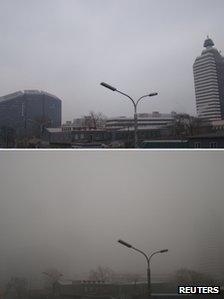Severe pollution shrouds Chinese capital
- Published

The thick smog comes from coal-burning and vehicle emissions
Severe pollution has covered the Chinese capital for the second time in two weeks, reducing visibility to 200m in some places.
Air quality readings taken by the US embassy put levels of the smallest, most hazardous pollutants at 20 times the recommended limits.
Flights were cancelled in four cities and residents urged to stay indoors.
Public debate over the smog has increased in recent months, with state media taking an active part.
In an editorial on Tuesday, China Daily said that Beijing will not become a liveable city unless it "improves its living environment".
"Of all the things that need improving, cleaner air will be at the top of many people's wish list," it said in a piece that looked at challenges for incoming Mayor Wang Anshun.
WHO guidelines say average concentrations of the tiniest pollution particles - called PM2.5 - should be no more than 25 microgrammes per cubic metre. Air is unhealthy above 100 microgrammes and at 300, all children and elderly people should remain indoors.
An unofficial reading from a monitor at the US embassy, external recorded levels of 526 at 06:00 on Tuesday (22:00 GMT on Wednesday). Two weeks ago, levels of over 800 were recorded.
State media said government organisations had been told to take 30% of official vehicles off the street and a number of heavily polluting businesses ordered to suspend operations.
Images showed pedestrians wearing face masks and cars using their headlights as they drove through shrouded streets.
The pollution comes from coal and vehicle emissions. The city has already proposed scrapping older vehicles, banning new polluting factories and fining street sellers who barbecue food outside on smoggy days, reports the BBC's Damian Grammaticas in Beijing.
- Published27 January 2013
- Published14 January 2013
- Published12 January 2013
- Published18 October 2012
- Published21 January 2012
- Published16 May 2012
- Published5 June 2012